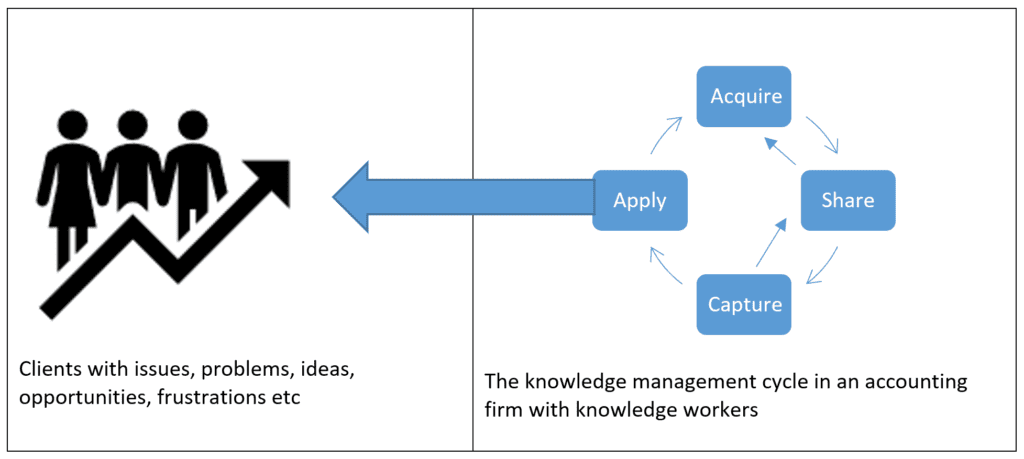If you asked an accountant 30 years ago what they sell many would have said time. Even in 2021 I occasionally hear an accountant talk this way. I think most today would say knowledge is what they sell. The need for this knowledge is a natural consequence of the complex world we live in. As an individual it is just not possible for us to know everything we need to know to get through life. Thus we turn to people who have knowledge in areas that we don’t. For example, a doctor or other health professional, a lawyer, architect, engineer or accountant, amongst others.
The Oxford Dictionary defines knowledge as:
Facts, information, and skills acquired through experience or education; the theoretical or practical understanding of a subject.
Accountants have built their knowledge through education and experience and make it available to clients for a fee which rewards them for their effort to build that knowledge and apply it for the benefit of the client. Accountants are often described as knowledge workers – and the definition of knowledge workers on Wikipedia (and other places) specifically references accountants. Wikipedia defines knowledge workers as:
workers whose main capital is knowledge. Examples include programmers, physicians, pharmacists, architects, engineers, scientists, design thinkers, public accountants, lawyers, and academics, whose job is to “think for a living”.
My understanding is that one of the first, if not the first, use of the term knowledge worker was by Peter Drucker (the father of management) in his 1959 book The Landmarks of Tomorrow. Drucker defined knowledge workers as high-level workers who apply theoretical and analytical knowledge, acquired through formal training, to develop products and services. He noted that knowledge workers would be the most valuable assets of a 21st-century organisation because of their high level of productivity and creativity. He was right!
So why is this of interest or important to running a better accounting firm? In short, the better your firm is at being able to capture knowledge and apply it to help clients, the more successful it is likely to be. Some people call the way you tackle this “knowledge management”.
The knowledge management cycle and how it interacts with clients

Let’s look at each of the four steps in the knowledge management cycle:
Acquire
As per the definition of knowledge, accountants gain their knowledge primarily through education and experience. Education starts at school but is brought into focus through a university degree and then often the CA, CPA or IPA programs and other post graduate study. This is typically supplemented by training inside firms. Three types of training that I believe firms must have are:
- Technical
- Non-technical
- How things are done around here
For a detailed explanation of these see my article here.
The acquisition of knowledge through experience is at the heart of most firms. People are trained to perform tasks and guided by more experienced colleagues, have their work reviewed and learn from the process. On the whole most firms are pretty good at this although one area I often see where firms could do better is in involving less experienced team members in meetings with clients. I believe letting these team members see the more experienced person in action and to be contributing in a small way to such meetings is a really powerful way to build the knowledge of your accountants.
Share
There is a saying that “knowledge is power”. In some firms this mentality can lead to a reluctance to share knowledge. This could be described as organisational myopia where there is a strong desire not to share knowledge but rather to work in silos with limited collaboration with others. This is a terrible way to operate in my view. Great firms have a culture of sharing and collaboration.
Capture
Knowledge is only truly captured within an organisation when it is documented in some way. It becomes explicit because anyone in the organisation can access it. Contrast this with tacit knowledge which is in a person’s head. I believe one of the holy grails inside an accounting firm is being able to get a significant amount of tacit knowledge converted to explicit. In law firms precedent documents are one component of this. In accounting firms a significant part of this can be in policies, procedures, templates and other guidance material the firm has. In my experience however not many firms really capture much of the high level thinking and smarts that an experienced partner or director has.
When it comes to capturing knowledge one challenge is that it is easy for an organisation to forget what it knows because once captured and stored no one can find it again! We could call this organisational amnesia and to avoid this you need an excellent way to capture and retrieve.
Apply
Knowledge without application is arguably pretty useless. The skill of the accountant is in listening to the client and applying their knowledge to help the client. My view is that your ability to apply the knowledge inside an accounting firm is greatly enhanced if the knowledge of all individuals in the firm has been shared, captured and turned into systems and processes, particularly for the delivery of answers to clients. See an earlier article here on the value of standardised systemised ways of doing work in firms. In addition to apply your knowledge effectively requires listening to each client and truly understanding their wants and needs.
The future
One of the challenges I see for accounting firms in the longer term is the possibility that some of the problems that accountants currently solve for clients, through the application of their knowledge, may be solved in other ways. My reason for saying this is the obvious impact the computer technology is having on how knowledge is accumulated and consumed. The application of artificial intelligence and bots for example will likely have a significant impact. That is a big topic for another day but one that warrants attention.
My tip – leverage the tacit knowledge in your firm
Work on ways to get knowledge out of the heads of your senior people and into some form of system which allows others to access it. While it is tempting to think of this as a technology challenge I believe the real challenge is a cultural one in many firms. For this to work there needs to be a genuine culture of sharing and collaboration supported by the appropriate technology. An example of a tool that support this might be a wiki – your very own Wikipedia inside your firm focused on capturing and sharing knowledge.

